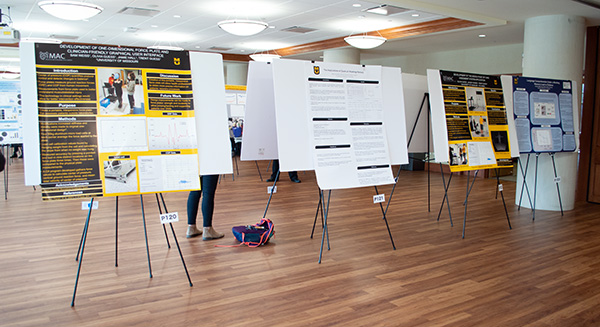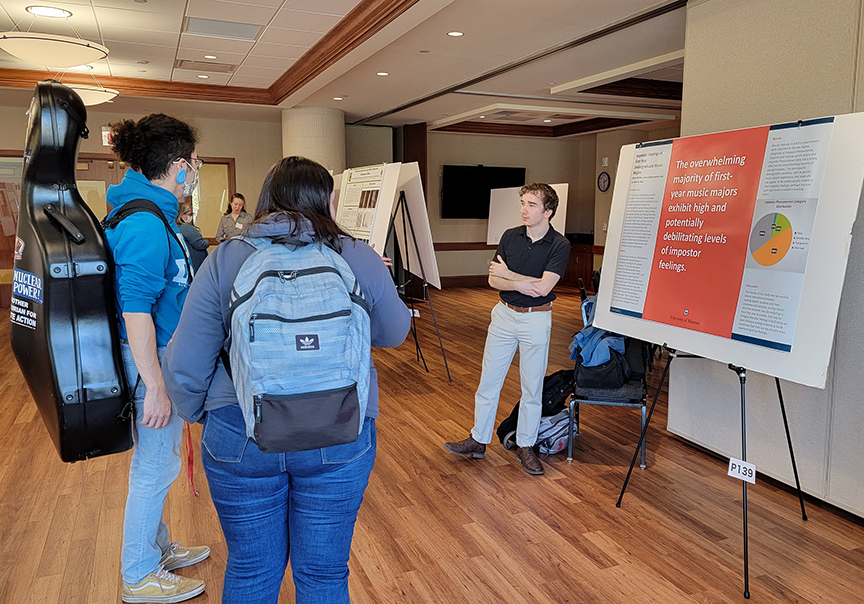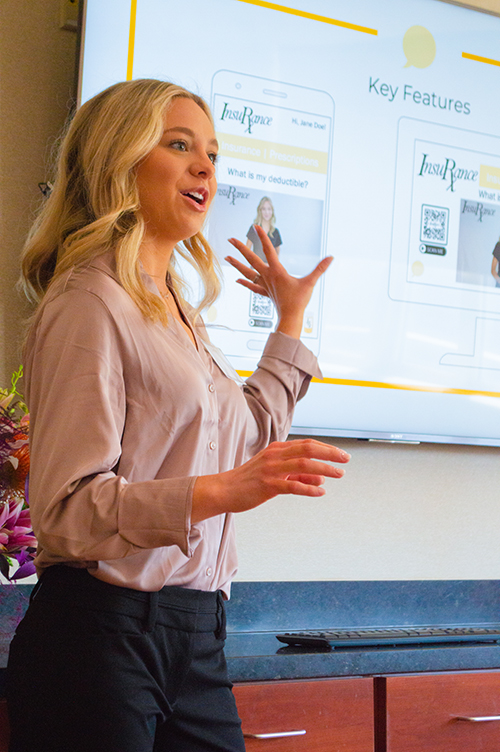
The Office of Undergraduate Research hosts two major campus-wide events each year where undergraduates can communicate and share their work with the campus and local community:
- The Symposium during MU’s annual Show Me Research Week showcases student scholarly and creative achievements each spring. This event showcases the work conducted by undergraduates, graduates, and postdoctoral fellows.
- The Summer Research and Creative Achievements Forum (a.k.a. The “Forum”) features the work of undergraduates, (both visiting students and MU undergrads) at the end of the summer.
Students from all majors and disciplines are encouraged to present.
- Ask your faculty mentor if your abstract may be published online. Review the submission categories with your MU faculty mentor to determine which one best fits your submission.
- If you receive any compensation for your work, confirm with your faculty mentor the source of that funding.
- Confirm the appropriate listing for your faculty mentor’s full name and academic department.
- Look up, or double-check, the official listing of your academic major and/or minor.
- Determine your poster and abstract title (15, or fewer, words).
- Identify your preferred presentation format (poster/display or 5-8 minute oral presentation)
- Confirm availability for presentation sessions (identify top three times)
- Decide if your work can be presented as part of the Humanities Symposium
- Identify any co-authors (*See ‘Collaborations’ below)
- Determine the appropriate listing of your poster and abstract authors: presenting student first, faculty advisor last
- Ensure that your abstract or artist statement is ready to upload
- Maximum of 300 words (not including title and author names)
- In PDF format
- Using file-naming convention: LastNameFirstInitial_Abstract (Ex: SmithJ_Abstract.pdf)
Presenters will submit their project title and abstract during the registration process.
Presenters should write a summary that clearly and concisely communicates the key information of their work to a general audience lacking expertise in the field. Like a movie trailer, the summary should leave the reader eager to learn more but knowledgeable enough to grasp the scope of the work. The specific information to include in the abstract is based partly on the type or scholarship: applied design, research, or artistic expression. Check the “How to Write an Abstract” page for more specific guidelines about writing these types of summaries.
We also encourage you to work with the tutors at the Writing Center (located in the Student Success Center on Lowry Mall.) The tutors have been trained to assist students with all different types of papers and documents; this includes a research abstract and the artist statement.
Abstracts and Artist Statements are limited to 300 words, not including the project title and authors’ names. Abstracts in PDF format are submitted as part of the application process. The files should be named using the following convention: LastNameFirstInitial_Abstract (ex: TigerT_Abstract.pdf)
There are seven (8) categories, when you register for the Forum, you will select under which category your research/scholarship falls.
This should be discussed with your mentor before you apply.
- Artistic Expression – Visual art pieces, fashion design, music, theater, and creative writing. Performance-based projects will also be included in this category.
- Applied Design – Projects that solve a problem with an original design solution including, but not limited to, design projects for theater, architectural studies, photojournalism, graphic design, and advertising.
- Humanities – Projects using methods appropriate to study modern and ancient languages, literature, history, philosophy, religion, culture, journalism and other humanities disciplines.
- Social & Behavioral Sciences – Projects using research methods appropriate to human behavior and social systems including, but not limited to, psychology, anthropology, sociology, education, public health, economics, political sciences, communication studies, journalism, and business.
- Life Sciences – Lab-based, field-based, or theoretical projects answering basic and applied questions in biology, biochemistry, ecology, biomedicine, etc.
- Physical & Mathematical Sciences – Experimental and theoretical research in the natural sciences and mathematical sciences, excluding the life sciences.
- Engineering Sciences – Experimental and applied research designed to understand and build effective structures, systems, and processes.
- Informatics – The science of how to use data, information and knowledge to address complex questions.
Please visit the Show Me Research Week “Presenters Page” for more information.
Students will present their research in-person during one (1) 90-minute session. During the registration process, students should rank their potential availability for all sessions.
- Poster presentations: Students are expected to be next to their posters for the entire 90 minutes.
- Oral presentations: Students are expected to stay and listen to all students presenting during the session.
*The organizers will do all that they can to accommodate the student’s top 1-3 choices in session presentation. Considerations of presentation judging, and when their lab mates (if they have any) are presenting will play a part in the session assignment.
Posters should be put up by 9am on the day they have been assigned to present.
This allows their poster to be viewed during the entire day of sessions (9:00 am-3:30 pm).
Example: Student A has the session on Tuesday at 12:30-2:00 pm, they will put their poster up by 9:00 am on Tuesday, return by 12:25 pm to present their research, leave and come back by 4:30 pm Tuesday to pick up their poster.
For ShowMe Research Week, students will return at 4:00 pm to collect their poster.
Posters left hanging at the end of the day will be considered abandoned, and the campus events team will likely put them in the trash.
Staff will be available to direct students to their poster location the morning each day starting at 8am.
During the registration process, students will be asked to select their preferred presentation format:
Posters

Prepare your poster so that it can be displayed on a cork board that is 45″ tall and 45″ wide. Many large format printers use paper that is 42″ wide, thus limiting one of the dimensions of your poster. Check with the printing facility you will be using. Push pins will be provided. Posters may follow the format of a typical research poster. Posters may also be used to visually communicate the nature of other types of scholarly projects, results, and reflections – this approach is particularly well suited to artistic performances or multi-piece design projects.
Students may opt to display a small object related to their research and scholarship on a small table next to their poster. Examples of objects may include a 3-D model of a chemical, jaw bones of reptiles for comparative purposes, or prototypes of new designs for artificial limbs. (Small tables are limited in availability, and if needed, must be requested at the time of application. Otherwise, the student will need to provide this themselves.)
Students may also find that a laptop computer or iPad will provide relevant digital images or performances to their projects. Digital images should be used to illustrate examples that cannot be easily shown on a poster. These images should not take the place of a poster. Students will not be permitted to show digital images on a laptop in lieu of a poster.
For guidance on designing and printing your poster, click here.
Oral Presentations

Some scholarship is best communicated with an oral presentation instead of a poster. We encourage students to discuss this option with their research mentor before registering to present.
Format of Oral Presentations
- Oral presentations will be held in a room separate from the poster session; however, oral sessions will run concurrently to the poster sessions
- Your presentation should be 5-7 minutes in duration, leaving the remainder of time in your 10-minute block for questions and transitions between presenters
- You can present with or without the use of visual aids. A projector will be available if you wish to show slides
- You will be limited to no more than eight (8) slides
- Slides must be submitted in advance of the event (usually one week)
- You are expected to stay and listen to all presenters in your session
- Dress code: business casual
- Invite your research mentor, professors and friends to attend!
Sponsored by a different academic department each year, the Humanities Symposium will spotlight the scholarship of undergraduate students working in important fields such as history, literature, jurisprudence, philosophy, comparative religion, ethics, languages, archaeology, and the arts. Collectively, these fields help us envision where we are going together as human beings. Each year, contributors to the symposium are invited to reflect upon a specific theme. Click here to learn more about this year’s symposium.
In addition to having their presentations (poster or oral) highlighted as part of the Humanities Symposium, students may be invited by the faculty organizers to participate in a special oral session or panel discussion.
To learn more about the 2024 Humanities Symposium, click here.
After you have completed your registration, there are still a few other things that you will need to do. You will receive an email confirming your registration. (Be sure to check your JUNK/SPAM folder!)
1) Receive ‘approval’ by your primary mentor
- If approval is given, no further action is needed from the presenter
- If registration approval is denied, the presenter should make requested corrections within the registration system
- Once complete, another approval request will be sent to the mentor
2) Complete the Photo/Video Release and upload it following the emailed instructions
3) Complete the Presentation License and upload it following the emailed instructions
We have put together a tip sheet with additional information for you that you may find helpful, including special information on how to print your poster and receive a special price through FedEx. Click below.
For Show Me Research Week – organizers will notify presenters during the first week of April regarding their assigned presentation session.